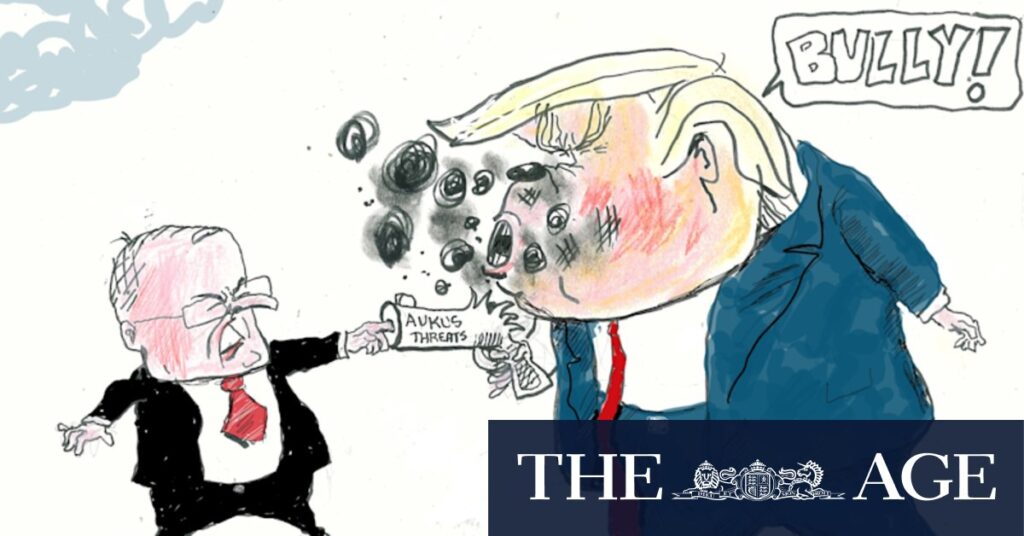
Australia’s sovereignty is under scrutiny as the nation grapples with the complexities of the AUKUS security pact. This trilateral agreement, forged with the United States and the United Kingdom, has sparked debates over Australia’s autonomy in foreign policy and military decisions. The controversy intensified when the Australian government committed billions to enhance the U.S. submarine manufacturing capacity, only for the U.S. to later reconsider its stance on the agreement.
The Australian Defence Minister’s recent decision to allocate hundreds of millions of dollars to bolster U.S. submarine production has raised eyebrows. This move, aligned with the AUKUS agreement, comes at a time when influential voices in Washington are questioning the wisdom of sharing submarine technology with Australia. Some U.S. leaders have even suggested that Australia should further subsidize the U.S. submarine industry beyond the agreed $4.7 billion and commit to deploying any acquired submarines in potential conflicts, notably with China.
Historical Context and Strategic Concerns
The AUKUS pact, announced in September 2021, was hailed as a landmark security arrangement aimed at countering China’s growing influence in the Indo-Pacific region. However, the lack of a definitive timeline for the delivery of nuclear-powered submarines has left Australia in a precarious position. The pact’s critics argue that it compromises Australia’s sovereignty by binding the country to U.S. military objectives.
Historically, Australia has balanced its alliances with both Western powers and regional neighbors. The AUKUS agreement marks a significant shift towards a deeper military integration with the U.S., raising concerns about Australia’s ability to independently navigate its foreign policy.
Calls for a Comprehensive Review
Amidst these developments, there is a growing call for a thorough review of the AUKUS agreement. Experts and public stakeholders are urging the Australian government to reassess its defense priorities in light of rapidly evolving global threats and technological advancements in military equipment.
Andrew Trembath, a prominent voice from Blackburn, emphasizes the need for Australia to assert its sovereignty. “Australia must stand up for its sovereignty and never concede its right to make its own foreign relations and military decisions,” he stated, advocating for a transparent review process that includes public and expert submissions.
The Broader Implications of AUKUS
The implications of the AUKUS pact extend beyond military strategy. It has sparked discussions about the broader geopolitical landscape and Australia’s role within it. The agreement has been perceived as a counterbalance to China’s assertiveness, yet it also risks escalating tensions in the region.
According to defense analysts, Australia’s commitment to AUKUS could lead to increased military engagements in the Indo-Pacific, potentially drawing the nation into conflicts that may not align with its national interests. The strategic environment is rapidly changing, and Australia must navigate these waters carefully to maintain its autonomy while ensuring regional stability.
Expert Opinions and Future Prospects
Defense experts highlight the need for Australia to diversify its strategic partnerships and invest in indigenous defense capabilities. This approach would enable Australia to maintain a degree of independence while fulfilling its security obligations.
“Australia’s future security lies in its ability to balance alliances and maintain a robust, independent defense posture,” remarked a leading defense strategist.
The path forward for Australia involves not only reassessing the AUKUS agreement but also strengthening its diplomatic ties with regional partners. As the geopolitical landscape evolves, Australia must ensure that its strategic decisions reflect its national interests and uphold its sovereignty.
Conclusion: Navigating a Complex Future
The AUKUS agreement has undoubtedly placed Australia at a crossroads. As debates continue over the nation’s sovereignty and strategic direction, the government faces the challenge of balancing its commitments to allies with the imperative of maintaining an independent foreign policy.
Looking ahead, Australia must engage in a comprehensive review of its defense strategy, taking into account the rapidly changing global environment. By doing so, it can ensure that its future security arrangements are aligned with its national interests and uphold its sovereignty in an increasingly complex world.






